一般疑问句练习题修订稿
(完整版)小学五年级英语一般疑问句练习

一般疑问句练习(一)一、做肯定/否定回答 1、yes + 人称代词 + be动词He is my English teacher.(改为疑问句)做肯定回答做否定回答My sister is a pretty girl. (改为疑问句)做肯定回答做否定回答The grapes are sour. (改为疑问句)做肯定回答做否定回答Eggplant is my favourite food. (改为疑问句)做肯定回答做否定回答2、yes + 人称代词 + haveI have a new teacher (改为疑问句)做肯定回答做否定回答He has a new clothes. (改为疑问句)做肯定回答做否定回答3、yes + there + be动词There is a village over there.(改为疑问句)做肯定回答做否定回答There is a lake in the nature park. (改为疑问句)做肯定回答做否定回答There are any panadas in the mountains. (改为疑问句)做肯定回答做否定回答二、缩写 Who is : is not : they are: What is:are not: you are: Where is: do not: I am: He is: does not: I would like: She is:must not: can not:There is there are 三、星期名词填空:一般疑问句练习:情况1: Be(是) am is are先用be的适当形式填空然后按照要求变换句型I ____ a student.一般疑问句:_____________________________________肯定回答:_____________________________否定回答:__________________________________ You _____ a teacher.一般疑问句:____________________________________肯定回答:__________________否定回答:_____________________________________He ____ a doctor.一般疑问句:____________________________________肯定回答:____________否定回答:_________________________________________ she a nurse?陈述句:_______________________________肯定回答:_______________否定回答:__________________________________ we happy?陈述句:_______________________________肯定回答:______________否定回答:____________________________You _____ good workers.一般疑问句:_______________________________肯定回答:_________________否定回答:____________________________They _____ workers.一般疑问句:_______________________________肯定回答:__________否定回答:__________________________________ (它是) an apple.一般疑问句:_______________________________肯定回答:____________否定回答:____________________________情况2:部分情态动词can后面动词用原型。
初中一般疑问句练习题及答案

初中一般疑问句练习题及答案在英语的学习中,一般疑问句的转换及回答是经常碰到的问题,现在我们就来探讨一下有关一般疑问句的问题。
一、什么是一般疑问句用Yes或No作答的疑问句叫一般疑问句。
一般疑问句还有下列特点:1、以be动词、助动词或情态动词开头;例:Is your father a teacher? Does Catherine like animals? Can Jenny speak French?2、往往读升调;3、译成汉语,都可以带上“吗”,例如上面三句可分别译为:你父亲是老师吗?凯瑟琳喜欢动物吗?詹妮会说法语吗?二、如何将陈述句变成一般疑问句?要将陈述句变成一般疑问句,可以遵循下列步骤:1.看句中有没有be动词、助动词或情态动词,如果有,将其提到句首,句末打上问号即可。
例:It was rainy yesterday.→Was it rainy yesterday?Tom’s father can play the piano.→Can Tom’s father play the piano?I have finished my homework.→Have you finished your homework?2.如果句中没有be动词、助动词或情态动词,则根据谓语动词的形式借助do的相应形式放在句首。
具体方法是:如果谓语动词是原形,则借do;如果谓语动词是一般现在时第三人称单数形式,则借does;如果谓语动词是过去式,则借did. 需要注意的是,借does或did后,原句的谓语动词要变回原形。
例:They go to school by bike.→Do they go to school by bike?Bill gets up at:30 every day.→Does bill gets up at:30 every day?The students saw a film yesterday.→Did the students see a film yesterday?三.陈述句变一般疑问句应注意的事项陈述句变成一般疑问句除了遵循上述规则以外,还应注意下列几点:1.如果陈述句中有第一人称,则变问句时最好要变为第二人称。
零基础语法练习:一般疑问句2(附超详细解析)

疑问句练习:四类疑问句之一般疑问句(附超详细解析)一、把下列句子改为一般疑问句,并作简略回答。
1.Bob is reading a book.2.He works in the factory.3.Helen often does her housework after office.4.There are five people in my family.5.Grandfather likes to read newspapers in the evening.6.She has lunch at school.7.Miss Li is my English teacher.8.The students are playing the guitar now.9.Li Ping’s brother is a bus driver.10.We are going to the cinema.11.I like dogs.12.I’d like some bread.13.Peter helps Lucy get the cat down.14.This is Ann’s bedroom.15.An tiger lives in the forest.16.Kitty is wearing her new uniform.17.The boy under the tree is hungry.18.He goes to school every day.19.I want to have a model car.20.She wants a cup of coffee.二、用do, does, be填空。
1. _____ she know all the answers ?Yes, she ____. No, she _____.2. _____ the twins often fight ?Yes, _____ do. No, _____ don’t.3. _____ your dad like listening to music? Yes, ____ does. No, _____ doesn’t.4. _____ uncle Tom wash his car everyday? Yes, ____ does. No, ____ doesn’t.5. _____ you have a new teacher?Yes, I ______. No, I ______.6. _____ she a teacher?Yes, she _____. No, she _____.7. ______ you playing ball now?Yes, I ______. No, I ______.8. ______ the pig like to sleep?Yes, it ______. No, it _____.9. _____ your father smoking in the living room? Yes, ____ is. No, he _____.10.____she buy a book yesterday?Yes, she ____. No, she ____.三、答案及解析第一题解析:1.Bob is reading a book.答案:Is Bob reading a book?Yes, he is.No, he isn’t.解析:一般疑问句的改法,当陈述句中有be..动词...时,可直接将../情态动词..../助动词它们提至句首,句末加“?”。
一般疑问句习题修订版

一般疑问句习题Company number:【WTUT-WT88Y-W8BBGB-BWYTT-19998】一般疑问句练习题练习1:陈述句变一般疑问句1. His father is an English teacher.___________________________________________ 2. These cats are crying.(喊叫)___________________________________________ 3. They can swim.___________________________________________ 4. I like to read(阅读) English.___________________________________________ 5. I go to school on foot.(走路)___________________________________________ 6. He likes English.___________________________________________7. His father goes to work by bus.(乘公共汽车)___________________________________________8. He is crying(哭) under the tree.___________________________________________9. His birthday is on the twentieth of November. ___________________________________________10. Mrs. Li and Kitty are in a big shop.___________________________________________11. Kitty is wearing her new uniform.___________________________________________12. The boy under the tree(树) is hungry.(饥饿)___________________________________________ 13. He goes to school every day.___________________________________________ 14. I want to have a model car(摩托车).___________________________________________ 15. She wants a cup(杯) of coffee(咖啡). ___________________________________________ 16. Mrs. Li and Kitty watch TV at night(在晚上).___________________________________________ 17. I do my homework(家庭作业) after(在……之后) school.___________________________________________ 18. Everybody is in the classroom.___________________________________________ 19. The boy does some housework(家庭作业) at home.___________________________________________ 20. The children had a good time in the park(公园).___________________________________________ 21. Jim has some story-books.(故事书)___________________________________________ 22. The old man does morning exercises(早操)every morning.___________________________________________23. We are from China.___________________________________________ 24. He often goes to the library(图书馆) on Sundays.___________________________________________ 25. They have a class meeting every week.___________________________________________ 26. She does smoke.__________________________________________ 27. He often watches TV.__________________________________________ 28. There is no problem(问题) about it.___________________________________________ 29. My father likes play Ping-Pong.____________________________________________ 30. There are 5 students in the classroom,_________________________________________ 31. He has some brothers,________________________________________ 32. They have Chinese map.____________________________________________ 33. Tom has few apples.____________________________________________ 34. My parents can play tennis____________________________________________ 35. He is watering the flowers in the park.____________________________________________ 36. This is my mother.____________________________________________ 37. These are my grandparents.____________________________________________ 38. I like salad.____________________________________________ 39. They like French fries.____________________________________________ 40. She likes bananas.____________________________________________ 41. Joy has a small T-shirt.____________________________________________ 42. I have many books about English.____________________________________________ 练习2把肯定句变为否定句1. His father is an English teacher.____________________________________________.2. These cats are crying.(喊叫)____________________________________________.3. They can swim.____________________________________________.4. I like to read(阅读) English.____________________________________________.5. I go to school on foot.(走路)_______________________________________________ .6. He likes English._______________________________________________ .7. His father goes to work by bus.(乘公共汽车)_______________________________________________ .8. He is crying(哭) under the tree._______________________________________________ .9. His birthday is on the twentieth of November. _______________________________________________ .10. Mrs. Li and Kitty are in a big shop._______________________________________________ .11. Kitty is wearing her new uniform.___________________________________________ . 12. Tom has some apples.___________________________________________ .13. He goes to school every day.___________________________________________ .14. I want to have a model car(摩托车).___________________________________________ .15. She wants a cup(杯) of coffee(咖啡). ___________________________________________ .16. Mrs. Li and Kitty watch TV at night(在晚上).___________________________________________ .17. I do my homework(家庭作业) after(在……之后) school.___________________________________________ . 18. Everybody is in the classroom.___________________________________________ . 19. The boy does some housework(家庭作业) at home.___________________________________________ . 20. The children had a good time in the park(公园).___________________________________________ . 21. Jim has some story-books.(故事书)___________________________________________ . 21. Jim has some story-books.(故事书)____________________________________________ . 22. The old man does morning exercises(早操)every morning.____________________________________________ .23. We are from China.____________________________________________ .24. He often goes to the library(图书馆) onSundays.____________________________________________ .25. They have a class meeting every week.____________________________________________ .26. She does smoke.____________________________________________ .27. He often watches TV.____________________________________________ .28. There is no problem(问题) about it.____________________________________________ .29. My father likes play ping pong.____________________________________________ .30. There are 5 students in the classroom,____________________________________________ .31. He has some brothers,____________________________________________ .32. They have Chinese map.____________________________________________ .33. Tom has few apples.____________________________________________ . 34. My parents can play tennis____________________________________________ .35. He is watering the flowers in the park.____________________________________________ .36. This is my mother.____________________________________________ .37. These are my grandparents.____________________________________________ .38. I like salad.____________________________________________ .39. They like French fries.____________________________________________ .40. She likes bananas.____________________________________________ .41. Joy has a small T-shirt.____________________________________________ .42. I have many books about English.____________________________________________ . 练习3:作肯定和否定回答1、Is this your pencil-case肯定回答:___________________.否定回答:___________________.2、Is that his backpack肯定回答:___________________.否定回答:___________________. 3、Are these her brothers肯定回答:___________________. 否定回答:___________________.4、Are those Tom’s parents肯定回答:___________________. 否定回答:___________________.5、Can you play the guitar肯定回答:___________________. 否定回答:___________________.6、Is this your sister肯定回答:___________________. 否定回答:___________________.7、Is this my pen肯定回答:___________________.否定回答:___________________. 8、Do you all(都、全部) at school 肯定回答:___________________.否定回答:___________________. 9、Do they like French fries肯定回答:___________________.否定回答:___________________. 10、Does he like pears肯定回答:___________________.否定回答:___________________. 11、Is that a Chinese car.肯定回答:___________________. 否定回答:___________________.12、Can you dance肯定回答:___________________. 否定回答:___________________.13、Can you paint肯定回答:___________________. 否定回答:___________________.14、Can she speak English肯定回答:___________________. 否定回答:___________________.15、Can you speak Chinese肯定回答:___________________. 否定回答:___________________.16、Can he play chess肯定回答:___________________. 否定回答:___________________.17、May I ask your question肯定回答:___________________. 否定回答:___________________.18、Do you like salad肯定回答:___________________. 否定回答:___________________.19、Is he your father肯定回答:___________________. 否定回答:___________________.20、Are you from China. 肯定回答:___________________.否定回答:___________________.21、Does Jason do his homework肯定回答:___________________.否定回答:___________________.22、Are these your grandparents.肯定回答:___________________.否定回答:___________________.23、Does he often watch TV肯定回答:___________________.否定回答:___________________.24、Does she want a cup(杯) of coffee(咖啡). 肯定回答:___________________.否定回答:___________________.25、Do you have many books about English 肯定回答:___________________.否定回答:___________________.26、Is his father an English teacher肯定回答:___________________.否定回答:___________________.27. Are her grandparents doctors(医生) 肯定回答:___________________.否定回答:___________________.28、Do they have Chinese map肯定回答:___________________.否定回答:___________________. 29、Can you swim肯定回答: ___________________. 否定回答:___________________.第三人称单数有哪些1. 第三人称单数代词有:he, she, it。
广州英语小升初一般疑问句反义疑问句选择疑问句修订稿
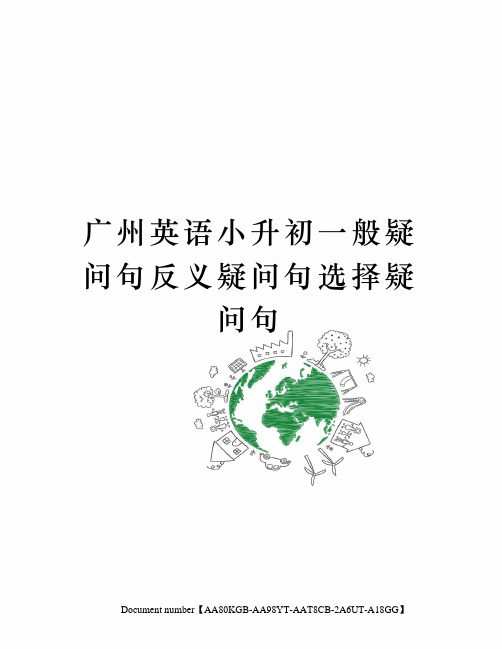
广州英语小升初一般疑问句反义疑问句选择疑问句Document number【AA80KGB-AA98YT-AAT8CB-2A6UT-A18GG】龙文教育一对一个性化辅导教案、一般疑问句,否定句,句型转换,反义疑问句语法小知识:1.be动词:am、is、 are、 was、 were;小学阶段,be动词后只接名词,形容词或动词的ing形式。
2.助动词:do、does、did、 have、 had;助动词后的动词用原形。
3.情态动词can、must、will、may、need等;情态动词+动词原形一、肯定句、否定句定义1.肯定句:表示肯定的意思, 即不含有否定词“不”。
例:我是一个学生 I am a student. 他去上学 He goes to school.2.否定句:表示否定的意思。
例:我不是一个男孩。
I am not a boy 他不去上学 He does not go to school.二、一般疑问句(一)、什么是一般疑问句用Yes或No作答的疑问句叫一般疑问句。
一般疑问句还有下列特点:1、以be动词、助动词或情态动词开头;例:Is your father a teacher Does Catherine like animalsCan Jenny speak French?2、往往读升调;3、译成汉语,都可以带上“吗”,例如上面三句可分别译为:你父亲是老师吗凯瑟琳喜欢动物吗詹妮会说法语吗(二)、如何将陈述句变成一般疑问句?要将陈述句变成一般疑问句,可以遵循下列步骤:1.看句中有没有be动词(am、is、 are、 was、 were)、助动词(do、does、did、 have、 had)或情态动词(can、must、will、may等),如果有,将其提到句首,句末打上问号即可。
例:It was rainy yesterday. →Was it rainy yesterday?Tom's father can play the piano. →Can Tom's father play the pianoI have finished my homework.→Have you finished your homework?2.如果句中没有be动词、助动词或情态动词,则根据谓语动词的形式借助do的相应形式放在句首。
一般疑问句练习题

一般疑问句练习题一般疑问句练习题一般疑问句是英语语法中的重要部分,用于询问事实、确认信息或寻求对方的意见。
它们通常以动词的助动词(do、does、did、am、is、are、was、were、have、has、had等)开头,并在句子末尾使用问号。
在本文中,我们将通过一些练习题来巩固和提高我们对一般疑问句的理解和运用。
练习题一:选择正确的疑问句形式1. _______ you like ice cream?A. AreB. DoC. DidD. Is2. _______ they go to the party last night?A. DidB. DoC. AreD. Does3. _______ she speak French fluently?A. DoesB. DidC. DoD. Is4. _______ he finish his homework yet?A. DidB. DoesC. HasD. Do5. _______ it rain tomorrow?A. DoB. DoesC. IsD. Will练习题二:改写下列陈述句为一般疑问句1. She likes to play tennis._______ she like to play tennis?2. They have finished their project._______ they finished their project?3. He is going to the supermarket._______ he going to the supermarket?4. I did my homework yesterday._______ you do your homework yesterday?5. We are going on vacation next week._______ we going on vacation next week? 练习题三:回答下列疑问句1. A: Do you like to read?B: _______.2. A: Did you see the movie last night?B: _______.3. A: Is she coming to the party?B: _______.4. A: Have you finished your work?B: _______.5. A: Will they be at the meeting?B: _______.练习题四:将下列对话改写为疑问句形式1. A: I am going to the store.B: Are you going to the store?2. A: They visited Paris last summer.B: _______?3. A: She plays the piano very well.B: _______?4. A: We have been friends for a long time.B: _______?5. A: He will arrive at 7 PM.B: _______?练习题五:根据提供的信息,编写适当的一般疑问句1. She is a doctor._______?2. They went to the beach yesterday._______?3. He has two sisters._______?4. We should study for the test._______?5. It is raining outside._______?练习题六:根据上下文,选择正确的一般疑问句A: I can't find my keys anywhere.B: _______ you check your pockets?A. DidB. DoC. HaveD. WillA: The train leaves at 9 AM.B: _______ you have the tickets?A. DidB. DoC. AreD. WillA: She is studying for her exam.B: _______ she need any help?A. DidB. DoesC. IsD. WillA: They have been waiting for over an hour.B: _______ the bus come yet?A. DidB. DoC. HasD. WillA: The party starts at 8 PM.B: _______ you bring a gift?A. DidB. DoC. AreD. Will通过以上练习题,我们可以更好地理解和运用一般疑问句。
句型转换陈述句变一般疑问句特殊疑问句及练习修订版
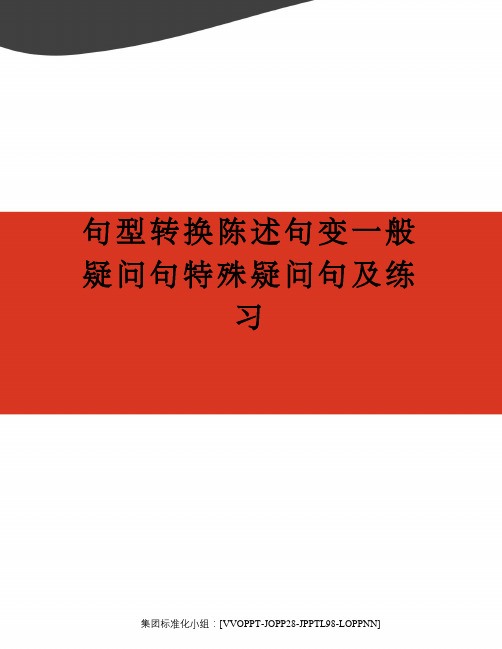
句型转换陈述句变一般疑问句特殊疑问句及练习集团标准化小组:[VVOPPT-JOPP28-JPPTL98-LOPPNN]初中英语句型转换一、肯定句改否定句的方法——一步法1. 有be动词/情态动词:在be动词/情态动词后后加not。
2. 无be动词/情态动词,在动词前加don’t / doesn’t / didn’t。
3. 肯定句中的some 改成any。
4. Be动词 am, is , are . 情态动词:can,will,should,must,may。
~~~把下列句子变成否定句:1. I am listening to music. _______________________________________2. Mike is a student. _______________________________________3. Sarah can clean the classroom. _______________________________________4. They are in the zoo. _______________________________________5. There are some flowers in the vase. _______________________________________6. This is my sister. _______________________________________7. We are sweeping the floor. ___________________________8. We need some masks. _________________________________9. They like making the puppet. _________________________________10. Su Hai and Su Yang live in a new house.______________________________________________11. I put a book on my head. _________________________________________________12. They sing “In the classroom” together._______________________________________________13. We play basketball on Sundays. _________________________________________________14. Tom likes listening to music. ____________________________________________15. We go to school on Sunday. _________________________________________________16. His father works hard. _________________________________________________17. Alice will go to the Summer Palace. ____________________________________________18. You should study hard for yourself . __________________________________________二、肯定句改一般疑问句的方法——三步法1. 有be动词/情态动词:be动词/情态动词提到句首,其余照抄,(some改any,my改your)句末用问号。
一般疑问句小学英语练习题
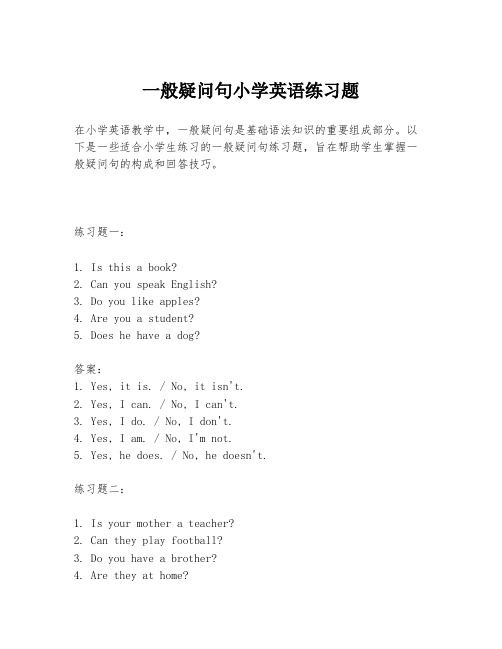
一般疑问句小学英语练习题在小学英语教学中,一般疑问句是基础语法知识的重要组成部分。
以下是一些适合小学生练习的一般疑问句练习题,旨在帮助学生掌握一般疑问句的构成和回答技巧。
练习题一:1. Is this a book?2. Can you speak English?3. Do you like apples?4. Are you a student?5. Does he have a dog?答案:1. Yes, it is. / No, it isn't.2. Yes, I can. / No, I can't.3. Yes, I do. / No, I don't.4. Yes, I am. / No, I'm not.5. Yes, he does. / No, he doesn't.练习题二:1. Is your mother a teacher?2. Can they play football?3. Do you have a brother?4. Are they at home?5. Does she live in China?答案:1. Yes, she is. / No, she isn't.2. Yes, they can. / No, they can't.3. Yes, I do. / No, I don't.4. Yes, they are. / No, they aren't.5. Yes, she does. / No, she doesn't. 练习题三:1. Is it raining?2. Can you swim?3. Do they have a cat?4. Are you hungry?5. Does he like music?答案:1. Yes, it is. / No, it isn't.2. Yes, I can. / No, I can't.3. Yes, they do. / No, they don't.4. Yes, I am. / No, I'm not.5. Yes, he does. / No, he doesn't. 练习题四:1. Is she your sister?2. Can he play the piano?3. Do you have a car?4. Are they in the classroom?5. Does she have long hair?答案:1. Yes, she is. / No, she isn't.2. Yes, he can. / No, he can't.3. Yes, I do. / No, I don't.4. Yes, they are. / No, they aren't.5. Yes, she does. / No, she doesn't.练习题五:1. Is he your friend?2. Can they dance?3. Do you like sports?4. Are you from Beijing?5. Does he have a bike?答案:1. Yes, he is. / No, he isn't.2. Yes, they can. / No, they can't.3. Yes, I do. / No, I don't.4. Yes, I am. / No, I'm not.5. Yes, he does. / No, he doesn't.通过这些练习题,学生可以加深对一般疑问句的理解,并且学会如何正确地构造和回答一般疑问句。
小学一般疑问句练习题(可编辑修改word版)
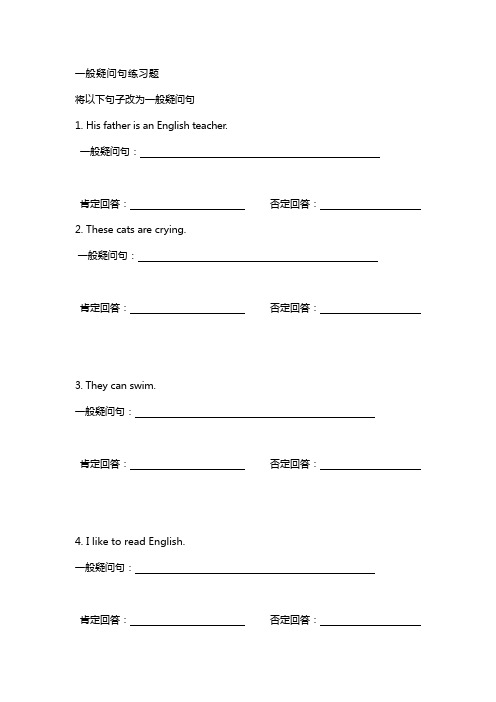
一般疑问句练习题将以下句子改为一般疑问句1. His father is an English teacher.一般疑问句:肯定回答:否定回答:2. These cats are crying.一般疑问句:肯定回答:否定回答:3. They can swim.一般疑问句:肯定回答:否定回答:4. I like to read English.一般疑问句:肯定回答:否定回答:5. I go to school on foot.一般疑问句:肯定回答:否定回答:6. He likes English.一般疑问句:肯定回答:否定回答:一般疑问句练习题将以下句子改为一般疑问句7. His father goes to work by bus.一般疑问句:肯定回答:否定回答:8. He is crying under the tree.一般疑问句:肯定回答:否定回答:9. His birthday is on the twentieth of November. 一般疑问句:肯定回答:否定回答:10. Mrs. Li and Kitty are in a big shop.一般疑问句:肯定回答:否定回答:11. Kitty is wearing her new uniform.一般疑问句:肯定回答:否定回答:12. The boy under the tree is hungry.一般疑问句:肯定回答:否定回答:一般疑问句练习题将以下句子改为一般疑问句13. He goes to school every day.一般疑问句:肯定回答:否定回答:15. I want to have a model car.一般疑问句:肯定回答:否定回答:16. She wants a cup of coffee.一般疑问句:肯定回答:否定回答:17. Mrs. Li and Kitty watch television at night.一般疑问句:肯定回答:否定回答:18. I do my homework after school一般疑问句:肯定回答:否定回答:。
一般疑问句的练习题

一般疑问句的练习题一般疑问句的练习题一般疑问句是我们日常交流中常用的句型之一。
它的特点是通过倒装来表示疑问,即将助动词或be动词提到主语之前。
在英语学习中,熟练掌握一般疑问句的构造和用法非常重要。
下面是一些关于一般疑问句的练习题,希望能帮助大家巩固和提高自己的语法知识。
练习一:改写句子为一般疑问句1. She is a doctor.2. They have finished their homework.3. He can swim.4. We should go now.5. I am going to the party.6. They were at the park yesterday.7. She has seen that movie before.8. He will come to the meeting.9. We have been to London.10. You should study harder.练习二:回答下列一般疑问句1. Is she a doctor?2. Have they finished their homework?3. Can he swim?4. Should we go now?5. Are you going to the party?6. Were they at the park yesterday?7. Has she seen that movie before?8. Will he come to the meeting?9. Have you been to London?10. Should you study harder?练习三:根据给出的答案写出相应的一般疑问句1. Yes, she is.2. No, they haven't.3. No, he can't.4. Yes, we should.5. Yes, I am.6. No, they weren't.7. Yes, she has.8. Yes, he will.9. Yes, we have.10. Yes, you should.练习四:选择正确的答案1. _______ you go to the party last night?a) Did b) Do c) Does2. _______ she like to dance?a) Does b) Do c) Did3. _______ they coming to the meeting?a) Are b) Am c) Is4. _______ he play the guitar?a) Does b) Do c) Did5. _______ you finished your homework yet?a) Have b) Has c) Had6. _______ she speak Chinese fluently?a) Does b) Do c) Did7. _______ they been to Europe before?a) Have b) Has c) Had8. _______ you seen that movie?a) Have b) Has c) Had9. _______ he going to the concert?a) Is b) Am c) Are10. _______ we meet at the park?a) Can b) Could c) Should练习五:用适当的疑问词填空1. _______ is your name?2. _______ did you go yesterday?3. _______ is your favorite color?4. _______ are you going to the party?5. _______ is your brother studying?6. _______ did you buy for lunch?7. _______ does she live?8. _______ time do you usually wake up?9. _______ did you meet at the café?10. _______ is your dog's name?练习六:根据情景编写一般疑问句1. 你想要一杯咖啡吗?2. 他们是你的朋友吗?3. 你会游泳吗?4. 你喜欢吃中餐吗?5. 他们昨天去了电影院吗?6. 你看过这部电影吗?7. 你会弹吉他吗?8. 你们已经完成作业了吗?9. 你们明天要去旅行吗?10. 你们见过彼得吗?以上是一些关于一般疑问句的练习题,通过不断练习,我们可以更好地理解和运用这个句型。
一般疑问句专项练习精选全文完整版

可编辑修改精选全文完整版一般疑问句专项练习1、______ everyone in his class __________ watching TV?A. Is,likeB. Are,likeC. Does,likeD. Do,like2、— your friend like playing football?—No,she .She likes playing table tennis.A.Do;don’tB.Does;doesn’tC.Do;doD.Doesn’t;does3、—_______ he have a clock?—No,he _______. He has a watch.A. Don’t;don ’tB. Do;doesn’tC. Do;don’tD. Does;doesn’t4、---______ he ______ from Beijing? ---No,he ______.A. Is,come,isn’tB. Does,come,isn’tC. Is,come,doesn’tD. Does,come,doesn’t5、________ that pair of ________ a little cheaper?A.Is;glassB.Are;glassC.Is;glassesD.Are;glasses6、everyone in your family meat?A. Does;likeB. Does;likesC. Do;likesD. Do;like7、___ you ever ___ Beijing roast duck before?A Did,tryB Have,triedC Will,tryD Do,try8、________ you like this bike?A. DoB. AreC. DoesD. Is9、_________ Zhang Yining play well in the national team 国家队)?A. DoesB. DoC. AreD. Is10、—_______ you from America?—No. I_______ from England.A.Are;areB. Are;amC. Is;areD.Do,come11、______ you and Millie like walking after school?A.AreB.DoC.DoesD.Is12、— the notebooks on the bed?—Yes,are.A.Is,theyB.Are,theseC.Are,thoseD.Are,they13、---_____the boys in our class enjoy ________the World Cup?---Yes,they____.A. Do ,watching,doB. Do ,to watch,areC. Does,watching,does14、--______you have four comic books? --No,_________.A.Do,we don’tB.Does,we don’tC.Do,we do15、______ your sweater the same ________Sandy’s?A. Is,asB. Does,likeC. Does,asD. Is,like16、_______ Australia?A.Do they from B.Are they come fromC.Are you come from D.Do they come from17、________ I close the window? It's so cold here.A. WillB. DoC. WouldD. Shall18、---___ the girl like elephants? ---Yes,______.A. Does,she doesB. Does,she doC. Do,she doD. Do,she does19、____________ your friend Anna _____________ a CD player?A. Do,haveB. Do,hasC. Does,hasD. Does,have20、__________ that old woman ___________ a house near the river?A.Do;hasB.Does;haveC.Does;hasD.Do;have21、-_______ there_______ interesting news in today's newspaper? - Yes,there_______.A. Is;any;is someB. Are;any ;are someC. Is;an;is oneD. Are;some;are some22、—Did you use to have short hair?—______________. But now I have long hair.A. Yes,I doB. No,I don’tC. Yes,I did .D. No,I didn’t23、_____ your mother_____ a watch?A. Do haven’tB. Do hasC. Does haveD. Does has24、______ she______ a CD?A. Do;haveB. Does;haveC. Does;playsD. Do;has25、------you pictures? -----Yes,I am.A.Do,takeB. Are,takingC. Do,taking26、_____your father usually go to work early every day?A. WasB. WereC. DoD. Does27、—____________ he _________ himself there? —No,I don’t think so.A. Do,enjoyB. Does,enjoiesC. Does,enjoysD. Does,enjoy28、―Can Li Hao drive a car ?― . It’s easy for him .A. Yes ,he canB. No,he can’tC. He can drive a busD. Yes ,he can’t29、It’s really cold today,______ ?A. does itB. doesn’t itC. isn’t itD. is it30、______ your father _____ with you?A. Does;strictB. Do;strictC. Is;strict D . Are;strict31、-Can you cook fish? - ________. It’s easy.A. No,I can’tB. Yes,I canC. Sorry,I can’tD. Yes,I need32、___________ two libraries in the school?A. Are thereB. Do thereC. Is thereD. Are their33、—___your grandmother watch TV in the evening? —______.She doesn't like watching TV.A.Does;No,she doesn't B.Doesn't;Yes,she doesn'tC.Does;Yes,she does D.Doesn't;No,she does34、—_______ she _______ her homework?—No,she isn’t. She is writing something.A. Does;doB. Is;doingC. Do;doD. Are;doing35、They have never been to New York,_______?A. have theyB. haven't theyC. don't theyD. didn't they36、—Is there a post office on Fifth Avenue?—Yes,.A. here isB. they areC. it isD. there is47、he always his birthday?A. Do;rememberB. Does;rememberC. Does;remembers参考答案1.C2.B3. D4. D5. C6. A7. B8. A9. A10. B11. B12. D13. A14. A15. A16.D17.D18.A19. D20.B21.A22.C23.C24.B25.B26.D27.D28. A29.C30.C31.B32.A33.A34.B35.B36. D37.B。
一般疑问句练习题

一般疑问句练习题一般疑问句练习题陈述句又分为肯定的陈述句和否定的陈述句,简称为肯定句和否定句。
一般疑问句是以be(am, is ,are),do等开头的句子,一般要用Yes/No…回答,即肯定回答和否定回答。
一、be动词开头的一般疑问句(一)知识点1、含be的肯定句转化为否定句时,直接在be(am, is ,are)后加上“not”即可。
其他部分不变。
2、含be的陈述句变一般疑问句的口诀:一调二改三问号。
例:肯定句:She is a student.否定句:She is not a student. =She isn’t a student.一般疑问句:Is she a student?肯定回答:Yes, she is.否定回答:No,she is not.=No, she is n’t.(二)练习一)、陈述句变一般疑问句并做肯定回答,否定回答。
Her father is an English teacher._________________________________________ ?2. Those are my dogs._________________________________________ ?3. They are his parents._________________________________________ ?4. That is your pen._________________________________________ ?5. These are her jackets._________________________________________ ?6.She is an English teacher._________________________________________ ?7. Jack is his father._________________________________________ ?8. He is in China now ._________________________________________ ?9. Her name is Helen._________________________________________ ?10. Xiao Li and Kitty are in Class 1._________________________________________ ?11. Kitty is her sister._________________________________________ ?12. The boy is my brother._________________________________________ ?13. This is my pencil._________________________________________ ?14. Those are her rulers._________________________________________ ? She is Miss Wang. _________________________________________ ?I am a student._________________________________________ ?二)、把肯定句变为否定句1. His father is an English teacher._____________________________________.2. They are my dogs._____________________________________.3.This is her pen._____________________________________.4.That is his cup._____________________________________.5. He is my teacher._____________________________________.6. These are my father’s jackets._____________________________________.7. Those are my mother’s photos._____________________________________.二、以Do/Does开头的一般疑问句。
初中英语一般疑问句练习题
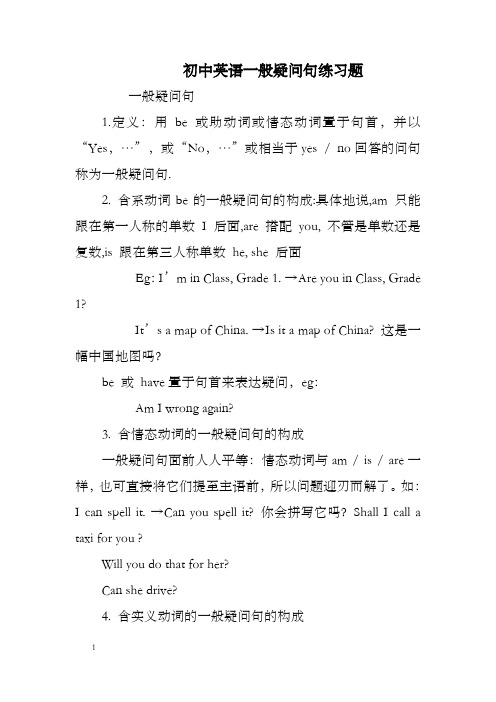
初中英语一般疑问句练习题一般疑问句1.定义:用be或助动词或情态动词置于句首,并以“Yes,…”,或“No,…”或相当于yes / no回答的问句称为一般疑问句.2. 含系动词be的一般疑问句的构成:具体地说,am 只能跟在第一人称的单数I 后面,are 搭配you, 不管是单数还是复数,is 跟在第三人称单数he, she 后面Eg:I’m in Class, Grade 1. →Are you in Class, Grade 1?It’s a map of China. →Is it a map of China? 这是一幅中国地图吗?be 或have置于句首来表达疑问,eg:Am I wrong again?3. 含情态动词的一般疑问句的构成一般疑问句面前人人平等:情态动词与am / is / are一样,也可直接将它们提至主语前,所以问题迎刃而解了。
如:I can spell it. →Can you spell it? 你会拼写它吗?Shall I call a taxi for you ?Will you do that for her?Can she drive?4. 含实义动词的一般疑问句的构成含实义动词的一般疑问句的构成稍微有点讲究,要在句首加do;如逢主语为第三人称单数,谓语动词为一般现在时单数第三人称形式“v-s”时,用does,并要将谓语动词变回原形;有时陈述句中的some还要变作any等。
如:She lives in Beijing. →Does she live in Beijing?I like English. →Do you like English?There are some books on my desk.→Are there any books on your desk?5. 一般疑问句的应答用yes / no回答,并怎么问怎么答,简略回答时要注意缩写和采用相应的人称代词以避免重复:即”Yes,主语+情态动词或am / is / are或do / does.”表示肯定;”No,主语+情态动词或am / is / are或者do / does not.”表示否定。
(完整版)小学英语一般疑问句、否定句和特殊疑问(附习题)(可编辑修改word版)

(完整版)⼩学英语⼀般疑问句、否定句和特殊疑问(附习题)(可编辑修改word版)⼀、肯定句改否定句的⽅法——⼀步法1、在be 动词后加not。
如:is not ,are not ,am not,was not,were not;2、在can,等后加not。
如:cannot3、上述都没有的,在动词前加助动词否定形式do not, does not. (don’t/doesn’t)4、some 改成any。
⼆、肯定句改⼀般疑问句的⽅法——三步法1、把be 动词放在句⾸,剩下的照抄,(some 改成any,my 改成your 等)句点改成问号。
2、把can,等放到句⾸,剩下的照抄,(some 改成any,my 改成your 等)句点改成问号。
例如:陈述句: They are in the park. He can play the guitar..⼀般疑问句: Are they in the park? Can he play the guitar?把下列句⼦变成⼀般疑问句1. I am listening to music.2. Mike is a student.3. Sarah can clean the classroom.4. They are in the zoo.5. There are some flowers in the vase.6.This is my sister.7.We are sweeping the floor.3、上述都没有的,在句⾸请助动词Do/Does 帮忙,剩下的照抄,(some 改成any,my 改成your 等)句点改成问号。
例如:陈述句: I like the ducks. He likes the dogs.⼀般疑问句: Do you like the ducks? Does he like the dogs?把下列句⼦改为⼀般疑问句。
1.We need some masks.2.They like making the puppet.3.Su Hai and Su Yang live in a new house.4.I put a book on my head.5.They sing “In the classroom” together.6.We play basketball on Sundays.7.Tom likes listening to music三、肯定句改特殊疑问句的⽅法——四步法1、在⼀般疑问句的基础上,句⾸添加⼀个疑问词即可,可根据划线部分确定是什么疑问词。
小学一般疑问句练习题
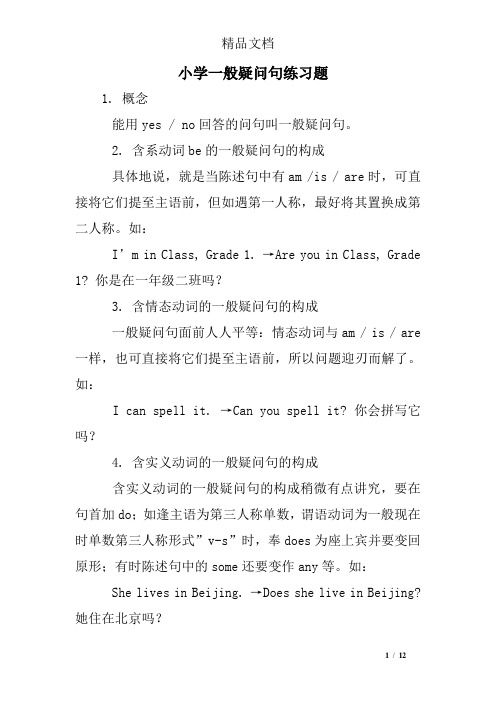
小学一般疑问句练习题1. 概念能用yes / no回答的问句叫一般疑问句。
2. 含系动词be的一般疑问句的构成具体地说,就是当陈述句中有am /is / are时,可直接将它们提至主语前,但如遇第一人称,最好将其置换成第二人称。
如:I’m in Class, Grade 1. →Are you in Class, Grade 1? 你是在一年级二班吗?3. 含情态动词的一般疑问句的构成一般疑问句面前人人平等:情态动词与am / is / are 一样,也可直接将它们提至主语前,所以问题迎刃而解了。
如:I can spell it. →Can you spell it? 你会拼写它吗?4. 含实义动词的一般疑问句的构成含实义动词的一般疑问句的构成稍微有点讲究,要在句首加do;如逢主语为第三人称单数,谓语动词为一般现在时单数第三人称形式”v-s”时,奉does为座上宾并要变回原形;有时陈述句中的some还要变作any等。
如:She lives in Beijing. →Does she live in Beijing? 她住在北京吗?I like English. →Do you like English? 你喜欢英语吗?There are some books on my desk.→Are there any books on your desk?5. 少数口语化的一般疑问句如问一个与前文相同的问句时,可省略成”And you?”或”What / How about...?”等;甚至只抓关键词,读作升调。
如:Your pen? 你的钢笔?6. 小插曲:一般疑问句的语调大部分的一般疑问句都应读作升调,并落在最后一个单词身上。
如:Is it a Chinese car↗?7. 一般疑问句的应答用yes / no回答,并怎么问怎么答,简略回答时要注意缩写和采用相应的人称代词以避免重复:即”Yes,主语+情态动词或am / is / are或do / does.”表示肯定;”No,主语+情态动词或am / is / are或者do / does not.”表示否定。
一般疑问句及练习
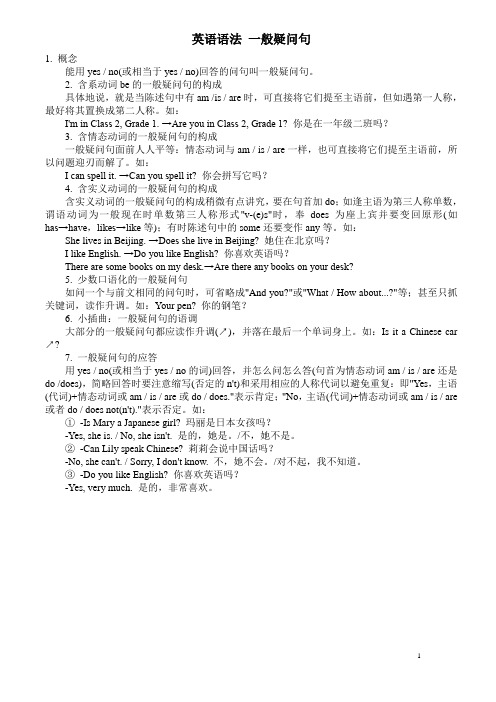
英语语法一般疑问句1. 概念能用yes / no(或相当于yes / no)回答的问句叫一般疑问句。
2. 含系动词be的一般疑问句的构成具体地说,就是当陈述句中有am /is / are时,可直接将它们提至主语前,但如遇第一人称,最好将其置换成第二人称。
如:I'm in Class 2, Grade 1. →Are you in Class 2, Grade 1? 你是在一年级二班吗?3. 含情态动词的一般疑问句的构成一般疑问句面前人人平等:情态动词与am / is / are一样,也可直接将它们提至主语前,所以问题迎刃而解了。
如:I can spell it. →Can you spell it? 你会拼写它吗?4. 含实义动词的一般疑问句的构成含实义动词的一般疑问句的构成稍微有点讲究,要在句首加do;如逢主语为第三人称单数,谓语动词为一般现在时单数第三人称形式"v-(e)s"时,奉does为座上宾并要变回原形(如has→have,likes→like等);有时陈述句中的some还要变作any等。
如:She lives in Beijing. →Does she live in Beijing? 她住在北京吗?I like English. →Do you like English? 你喜欢英语吗?There are some books on my desk.→Are there any books on your desk?5. 少数口语化的一般疑问句如问一个与前文相同的问句时,可省略成"And you?"或"What / How about...?"等;甚至只抓关键词,读作升调。
如:Your pen? 你的钢笔?6. 小插曲:一般疑问句的语调大部分的一般疑问句都应读作升调(↗),并落在最后一个单词身上。
如:Is it a Chinese car ↗?7. 一般疑问句的应答用yes / no(或相当于yes / no的词)回答,并怎么问怎么答(句首为情态动词am / is / are还是do /does),简略回答时要注意缩写(否定的n't)和采用相应的人称代词以避免重复:即"Yes,主语(代词)+情态动词或am / is / are或do / does."表示肯定;"No,主语(代词)+情态动词或am / is / are 或者do / does not(n't)."表示否定。
- 1、下载文档前请自行甄别文档内容的完整性,平台不提供额外的编辑、内容补充、找答案等附加服务。
- 2、"仅部分预览"的文档,不可在线预览部分如存在完整性等问题,可反馈申请退款(可完整预览的文档不适用该条件!)。
- 3、如文档侵犯您的权益,请联系客服反馈,我们会尽快为您处理(人工客服工作时间:9:00-18:30)。
一般疑问句练习题 Document number【AA80KGB-AA98YT-AAT8CB-2A6UT-
一般疑问句讲解及练习
陈述句 This is… Eg. This is my pen.
否定句 This is not This isn’t my pen. (isn’t=is not)
一般疑问句 Is this… Is this your pen
Yes, it is./ No, it isn’t. Yes, it is. / No, it isn’t.
有be动词(is , am, are)的用就be+not
没有be动词的就在主语的前面+do not或does not
二、如何将陈述句变为一般疑问句
把肯定句改为疑问句就是有be的就把be提到前面来,
没有be的就在句首加do或 does
Eg: I am a teacher. ----I am not a teacher.
She likes singing.------She does not like singing.
You are ten.-----Are you ten?
They get up at seven o’clock.---- Do they get up at seven o’clock?
三、一般疑问句的回答
以be 开头的一般问句用 yes , I am / No I’m not ….根据主语回答
Eg: Is He a teacher Yes ,he is./No he isn’t.
Are they /you/ we late Yes ,they/ you/we are
No,they /you/we are not.
练习:
将下列句子改成一般疑问句:并做肯定回答和否定回答
1. It is a lovely dog. ________________________________________
Yes,___________ No,____________
2.She is lovely girl. ________________________________________
Yes,___________ No,____________
3. He is my father. _________________________________________
Yes,___________ No,____________
4. They are Lily’s cousins. ___________________________________
Yes,___________ No,____________
5. We are classmates. ______________________________________
Yes,___________ No,____________
6. I am a doctor. ________________________________________
Yes,___________ No,____________
7. There is a bird in the tree. ________________________________ Yes,___________ No,____________
8. There are many stars in the sky. ____________________________ Yes,___________ No,____________
9. They are good friends. ____________________________________ Yes,___________ No,____________
10. I love my parents. _______________________________________ Yes,___________ No,____________
11. I play computer games every night. _________________________ Yes,___________ No,____________
12. There are many books on the shelf. __________________________ Yes,___________ No,____________
13. There was an ostrich in the zoo. _______________________________ Yes,___________ No,____________
14. We have a pleasant home. __________________________________ Yes,___________ No,____________
15. We like to climb the mountain. ______________________________ Yes,___________ No,____________
16. They go to the park on Sunday. ______________________________ Yes,___________ No,____________
17. They walk to school every morning. __________________________ Yes,___________ No,____________
18. It is a nice day. ______________________________
Yes,___________ No,____________
19. It is a big book. ______________________________
Yes,___________ No,____________
20. You are a singer. ______________________________
Yes,___________ No,____________。
